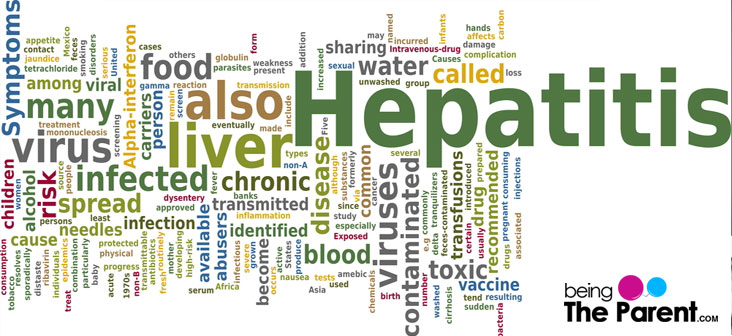
5 Types Of Hepatitis In Children And Their Prevention
7 min readWritten by Editorial Team

Do you know that 95% of people miss the first signs of Hepatitis infection and will be aware only after the infection starts to root? Around eighty percentage of the children who are infected by the Hepatitis virus before they turn one year old and 30% – 40% kids who get it before they turn six years will be subject to the deep impact of this infection. However, the good news is that few types of hepatitis can be cured completely and most of them can be prevented. Continue reading to know about different kinds of hepatitis in children and how you can shield the little one from being infected.

What Is Hepatitis?
Hepatitis refers to an inflammatory state of the liver. Even though there are several reasons which can bring out liver damage and cause hepatitis, a viral infection is the most common cause of hepatitis. With respect to the adults, children have a weaker immune system, making them vulnerable to the virus.
Types Hepatitis In Children
There are five types of hepatitis virus: A, B, C, D and E. While hepatitis D and E are not that common, grownups and children are often infected with hepatitis A, B or C. Hepatitis A is the less severe version of the disease. Hepatitis C and D falls under the more severe form of hepatitis. Children can get affected, irrespective of their age. As indicated by latest research, there is a possible sixth type of virus referred as Hepatitis G, which, however, to confirm requires more systematic study.
Hepatitis A
Hepatitis A is also known as infectious hepatitis. It is the most widely recognized hepatitis viruses in children. The disease is generally short termed and mild, in children.
- Symptoms
Children infected with hepatitis A usually develop mild symptoms or will never develop any symptoms at all. Some of the common symptoms include:
- Loss of appetite
- Fever
- Vomiting
- Abdominal pain
- Nausea
- Yellowing of skin and white part of the eye
- Dark colored urine
- Direct contact with infected person
- The virus is present in an infected person’s stool. When the child have food or water that is contaminated with the stool he or she could get hepatitis
- Hepatitis A is diagnosed by blood test
- There are no medications to treat hepatitis A. It is a transient disease that will resolve on its own over several weeks or months
- Also, unlike other types, the child will not be a carrier of this virus
- Make sure every member in the house washes their hands frequently before touching or giving the child any food
- Fruits and vegetables should be washed thoroughly
- Never give child semi-cooked food
- Make sure child is drinking filtered and boiled water
- Avoid any kind of food from the street vendors
- Even if you come to know that your child is exposed to the virus, there are a couple of steps, which should be taken as soon as possible, which will help to prevent the child from being infected.
- Vaccine is available for hepatitis A. Children above one year should get vaccinated for hepatitis A
- A Child with weak immune system will be given immunoglobulin(IG)
Hepatitis B
Hepatitis B is also known as serum hepatitis. The hepatitis B virus (HBV) causes it. Hepatitis B can give rise to chronic liver issues like liver cirrhosis, liver cancer and possibly liver failure, thereby having a long-term impact on the child’s health
- Symptoms
Children below 5 years, rarely develop symptoms of hepatitis B. Children above 5 years may develop symptoms 3 to 4 months after getting exposed to the virus. The main symptoms are:- Signs of jaundice like yellowing of skin, white part of the eye and dark urine
- Low fever
- Extreme tiredness
- Muscle and joint pain
- Nausea and vomiting
- Loss of appetite
- Stomach pain
- How does it spread?
- HBV is found in the infected person’s blood or body fluids like tears, saliva and semen. Unlike hepatitis A, HBV is absent in the stool of an infected person. Likewise, the child infected with hepatitis B can be a carrier. A child get infected by HBV from the blood or body fluids of the infected person.
- The child can be infected when a carrier of this disease scratches him that breaks his skin
- Sharing personal items, such as a toothbrush, with someone who has the virus
- The virus passes from the mother to the newborn baby if the mother carries HBV at the time of delivery
- If the child being stuck with the same needle or syringe, after used on an HBV-infected person, can be infected by the virus
- Diagnosing
- Diagnosis include blood tests known as hepatitis virus panel. It is a chain of blood tests used to discover present or past infection with hepatitis B
- Treatment
- There is no treatment for hepatitis B, which makes this infection more precarious. Your child’s immune system can fight off a less severe infection. However, as the severity increases, so will be ill effects. Getting plenty of rest, increasing the intake of fluid, sticking onto a healthy diet, etc. are some measures that will help to relieve the symptoms. Severe cases of acute hepatitis B can be treated with antiviral drugs to bring down the chances of the liver being seriously damaged
- Prevention
- The good news is that even though very dangerous, hepatitis B can be prevented by taking few careful steps.
All pregnant women should be screened for HBV. If an acute or chronic hepatitis B is diagnosed, there are some measures taken to keep the infection from being transmitted to a child during delivery:- Newborns ought to get their first hepatitis B vaccine and one shot of immunoglobulins (IG) within first 12 hours
- The baby must finish all hepatitis B vaccines as directed during the first six months
- Sometimes, pregnant women may be given medications to bring down the level of HBV in their blood
- Some of the other preventive measures include:
- Parents should take measures to keep their children away from getting in direct contact with blood and body fluids of the infected person
- Children should not share toothbrushes or any other personal items that have chances to get infected
- Always make sure that fresh needles and syringes are used when your child gets any shot
- The good news is that even though very dangerous, hepatitis B can be prevented by taking few careful steps.

Hepatitis C
Hepatitis C infection (HCV) is a chronic viral infection affecting the liver caused by hepatitis C virus. There are two kinds of hepatitis C infections. Acute and chronic. Acute type of hepatitis C is comparatively harmless and resolve within 6 months. Children who are not able to clear an HCV infection in the acute stage will be subjected to a chronic form of hepatitis C, a serious illness that can bring about long-term health issues and requires long-term care. Though hepatitis C is less common in children (affecting about 0.15% of 6-11- year-olds, and 0.4% of 12-19-year-old), it can potentially bring about liver cirrhosis even for a 8 year old child.
- Symptoms
The symptoms may not appear during the initial stages of the disease. After the incubation period of two to six weeks, the virus can cause ever-greater damage to the liver, and the child may develop the following signs:- Muscle pain
- Itchy skin
- Stomach pain
- Signs of jaundice
- Tiredness
- Gray colored stool
- Extreme fatigue
- Mild fever
- How does it spread?
Hepatitis C does not spread through air, touch or breast milk. In extremely rare cases, the infection can pass from the mother to the newborn. As the hepatitis C virus is blood-borne, the child most probably will get it:- If he or she is injected with a needle that is used on an infected person
- When medical equipment is reused without being sterilized
- If the child underwent a blood transfusion of infected blood
- Diagnosing
- Once the child develops symptoms, the doctor will suggest a serological test to check for anti-HCV antibodies and a nucleic test to check whether the infection is chronic
- Treatment
- Acute and chronic hepatitis C are treated very differently
- If the child has acute hepatitis C, the doctors will suggest ample rest, a good diet, and consuming lot of fluids
- If the infection has endured more than 6 months, the child has chronic hepatitis C, the doctor will recommend a treatment plan that incorporates administering anti-viral medication that eliminates the HCV from the body of the child. If the child experiences severe liver damage, a liver transplant may be necessary
- Prevention
- Make sure fresh needles and syringes are used while your child gets any shot
- Make sure safe blood is used if your child needs a blood transfusion anytime
Hepatitis D
Hepatitis D (also called delta)or HDV is a serious liver disease caused by the hepatitis D virus (HDV). HDV is a RNA virus. It does not act alone. It attacks the body combined with the HBV. The virus becomes stronger in the presence of the HBV. Children who are subjected to chronic hepatitis B infection are at a risk of contracting HDV.
- Symptoms
- Symptoms are similar to Hepatitis B
- How does it spread
- This is also similar to Hepatitis B. It spreads through contacts and body fluids
- Diagnosing
- It is diagnosed through blood test
- Treatment
- There is no recognized remedy for acute or chronic HDV infection, but the good news is that compared to hepatitis A, B, and C, Hepatitis D is rare in children. If exposed, the doctor may prescribe treatment using a drug known as interferon, as anti-viral medicines aren’t much effective against this virus
- Prevention
- Getting the child vaccinated against hepatitis B is the only way to prevent the hepatitis D infection

Hepatitis E
Hepatitis E is a waterborne infection. Hepatitis E is mainly found in regions with poor sanitation and is typically brought on by ingesting fecal matter
- Symptoms
- Low-grade fever
- Nausea
- Signs of jaundice
- Skin rashes
- Stomach pain
- Joint pain
- Vomiting
- How does it spread?
The hepatitis E virus is commonly found in regions that have poor sanitation or poor hygiene conditions- The virus is spread by coming in contact with contaminated food and water
- Undercooked contaminated meat, especially pork can bring about hepatitis E infection
- Diagnosing
- It is diagnosed through a blood test
- Treatment
- Similar to hepatitis C and D, hepatitis E does not have a particular treatment. Usually, it will resolve on its own. It usually will not develop into a severe stage. However, if it does then the child will be treated with anti-viral drugs to eliminate the virus from the system
- Prevention
- A hepatitis E vaccine has been invented yet is presently accessible just in China
- To prevent the infection,
- Ensure the kids drinks only clean water and food that is prepared at home
- Always wash and clean all the fruits and vegetables thoroughly before consuming them
- Never let the child eat food from street vendors, especially in the regions where the infection is widely spread
- Also, avoid undercooked meat and shellfish
- Ensure that your child strictly practices personal hygiene
So you see, Hepatitis can be a dangerous infection when left undetected and untreated especially among children. It can severely damage the liver which in turn can affect the health and quality of life of your child. So do take all the precautions necessary to keep your child away from this infection and do not skip getting your child vaccinated with the Hepatitis vaccination as per his immunization schedule.
We hope this article will provided you with an in-depth information about Hepatitis in children. Please feel free to share your experiences or inputs in the comments section below.

Editorial Team,
With a rich experience in pregnancy and parenting, our team of experts create insightful, well-curated, and easy-to-read content for our to-be-parents and parents at all stages of parenting.Read more.
Responses (0)
Want curated content sharply tailored for your exact stage of parenting?
Related articles
Sponsored content
Discover great local businesses around you for your kids.
Get regular updates, great recommendations and other right stuff at the right time.










